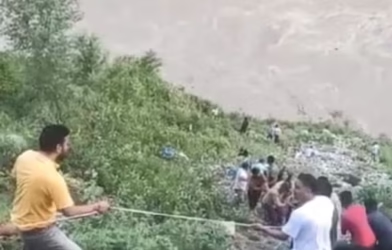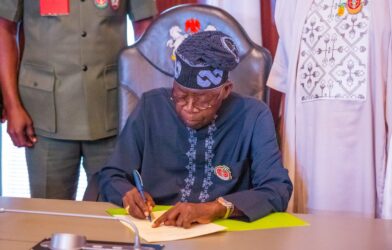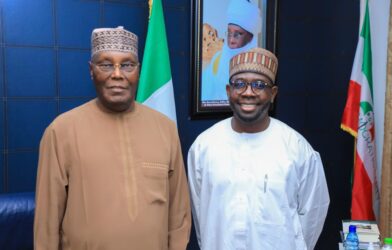276
Regional leaders ended their second emergency summit on Niger in Abuja on Thursday 10th August, by “ordering the deployment of the ECOWAS Standby Force to restore constitutional order in Niger,” where the military deposed elected President Mohamed Bazoum in a coup on 26th of July.
In the summit communique read by the ECOWAS Commission President Dr Oumar Alieu Touray, the Authority of Heads of State and Government also “directs the Committee of the Chiefs of Defence Staff to activate the ECOWAS Standby Force in all its elements immediately.”
Defence experts consider this a high-risk option, warning that political and diplomatic initiatives, would be more effective when combined with targeted sanctions.
The same Communique still “underscored ECOWAS’ commitment to restore constitutional order in Niger through peaceful means.”
It upheld the sanctions imposed on Niger, including financial freeze, border closure by ECOWAS member states.
The regional leaders also urged all partner countries and institutions, including the UN to support the ECOWAS measures using its normative instruments.
Nigerian President Bola Tinubu, who is Chair of the Authority had in his opening address, said that no option was off the table, including the use of force to restore constitutional order in Niger.
ECOWAS had on July 30 given the Brig-Gen. Abdourahamane-led junta a seven-day ultimatum to release and reinstate detained President Bazoum or face military action.
The ultimatum passed last Sunday, with not sign of any military intervention even as the junta consolidated its hold on power by naming a military-civilian cabinet of 21 ministers led by a civilian Prime Minister.
Regional Governors have also been appointed by the coup leaders who have banned flights and shut the country’s borders.
The ECOWAS Communique condemned the conditions under which Bazoum was being detained, warning that the coup leaders would be held accountable for his safety.
It noted that the current measures became necessary because diplomatic efforts, including an ECOWAS delegation to Niamey had not yielded positive results.
The Communique further said that the junta had refused to welcome a joint ECOWAS-AU-UN delegation to Niger.
However, the junta leaders on Tuesday received in Niamey, Nigeria’s former Emir of Kano Muhammadu Sanusi II, who briefed President Tinubu on Wednesday on the outcome of the mission which he said was undertaken in his personal capacity.
Thursday’s ECOWAS summit was attended by representatives of non-ECOWAS members Burundi and Mauritania, another Niger neighbour, which pulled out of the regional bloc in 2000.
Algeria, another key Niger neighbour, but non-ECOWAS member state, was however not represented. The country along with three ECOWAS suspended member States ruled by the military – Mali, Guinea, and Burkina Faso – have kicked against any military intervention in Niger.
Mali and Burkina Faso military regimes have warned that military action by ECOWAS would be considered a declaration of war against their countries and could lead to their withdrawal from ECOWAS and their joint measures to defend the armed forces and people of Niger.
Given such a delicate scenario, ECOWAS’ threat to deploy its Standby force to Niger also runs against independent dissenting opinions, including from Nigeria’s Senate, a group of Muslim Ulama, the Catholic Archbishops Conference of Nigeria, the Nigerian Guild of Editors, and group of “Concerned Nigerian Citizens.”
The concerned citizens in a statement called for diplomatic efforts to resolve the Niger crisis. They include Gen Martin Luther Agwai (rtd), former Chief of Defence Staff and Commander of the UN Mission in Darfur, Sudan, Senior Lawyer A.B. Mahmoud, former Chair of the Independent National Electoral Commission Prof Attahiru Jega, and a former Special Adviser to former President Muhammadu Buhari, Mrs Maryam Uwais.
Similarly, a group of Niger’s former Prime Ministers and MPs has also called on ECOWAS to lift its sanctions, which they said had inflicted sufferings on the Niger population.
Describing the sanctions as “punitive, unprecedented, harsh and unsustainable,” the group in their signed letter to the chair of the ECOWAS Authority and copied to the African Union, UN and EU, called on ECOWAS to explore diplomatic resolution of the Niger crisis.
ECOWAS leaders might have insisted on the threat to use military force in order to “teach the Niger coup makers a lesson for daring the regional organization.”
But defence experts have expressed reservations about the appropriateness of such as a high-risk kinetic option as well as the practicality of the military deployment, given that the regional Standby Force has been facing financial and operationalisation challenges.
Apart from the possibility of a military confrontation escalating into a catastrophic war, there is also the perception that ECOWAS could be acting under pressure from France and the U.S. which have military and economic interests in Niger.
Both nations have military bases in Niger and foreign companies have continued to exploit Niger’s priced natural resources such as uranium and gold, while its estimated 26 million population remain impoverished.
The Sahel and the ECOWAS regions have been scarred by insecurity characterized by sporadic deadly strikes by Islamic terrorists and other armed groups with high civilian and military casualties, especially in Mali, Burkina Faso and Niger.
The consequences of military intervention in the complex environment can be better imagined than experienced.
A stich in time saves nine!
Paul Ejime Is A Global Affairs Analyst & Consultant On Governance Communications












Comments are closed